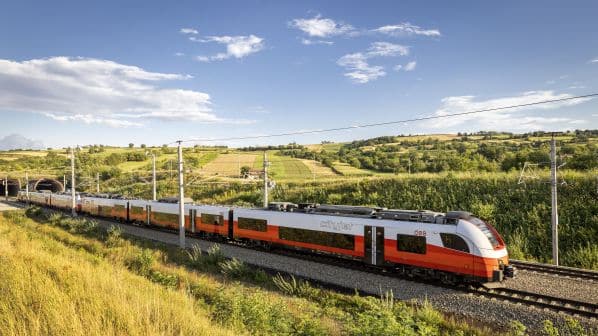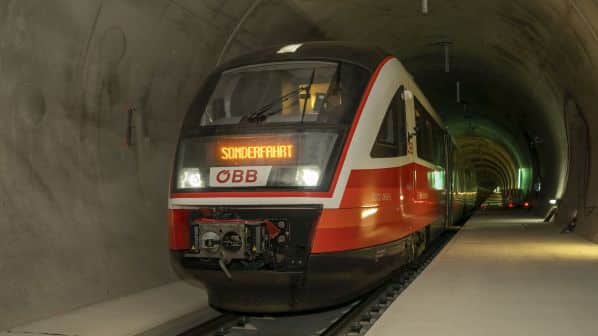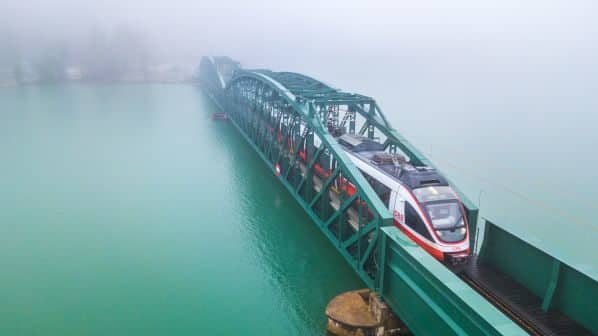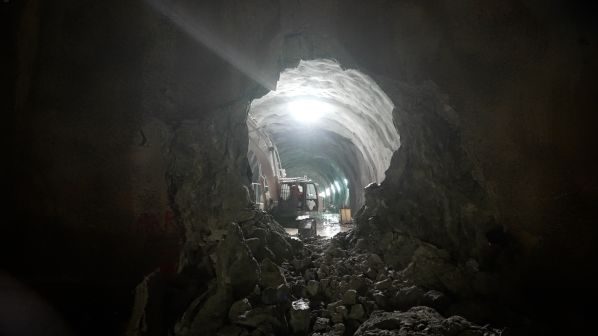AUSTRIA’s Climate Protection Ministry will provide €21.2bn for infrastructure investment under the 2024-29 framework plan agreed with Austrian Federal Railways (ÖBB), in order to encourage modal shift by providing more capacity on new and upgraded lines.
The delivery schedules and cost of ongoing projects will be adjusted, ÖBB says, but major projects such as the Semmering Base Tunnel, the new 250km/h Koralm railway under construction between Graz and Klagenfurt, and the Brenner Base Tunnel will continue as planned.
Investment will also focus on increasing local rail services in metropolitan areas. To help meet the government’s climate protection objectives, ÖBB will also invest to make regional services more attractive and undertake the necessary electrification programme.
As well as encouraging modal shift to more environmentally-friendly rail transport, spending under the 2024-29 framework plan will also help to combat the economic downturn and secure employment in the construction industry and related sectors.
ÖBB points to studies demonstrating that €1 of investment in rail creates value of €2 for the national economy, and says that a €1bn investment project will generate around 15,000 jobs during the construction phase.
New projects in the framework plan include a new line between Köstendorf and Salzburg, while providing four tracks on the Western line from Vienna in the Salzburg area will provide more capacity for freight as well as local and long-distance passenger services.
Double track will be provided on Werndorf - Hügel line, a key component of the route to the port of Koper in Slovenia, and on the Nettingsdorf - Rohr-Bad Hall section of the Pyhrn line. New regional projects include investment in the Herzogenburg - St Pölten line and the Ossiachersee line.
Other investment will target increasing freight capacity. ÖBB says that the provision of passing loops long enough to accommodate freight trains offers the maximum benefit for comparatively little effort, increasing capacity for both freight and passenger services.
Freight investment in the framework plan will also include support measures for connecting lines and a marshalling yard modernisation programme.
The framework plan will also focus on making greater use of renewable energy. One new element in the plan is the construction of additional mini-transformers to feed electricity generated by ÖBB’s own wind and solar power plants into the traction power supply network.
Accessibility improvements will continue at ÖBB stations, where the refurbishment programme will now include Straßwalchen, Maishofen-Saalbach and Leogang.
In addition to the €21.1bn being provided for investment projects, ÖBB will receive €4.7bn for the maintenance of the national rail network in 2024-29.
For the first time, the OBB framework plan includes infrastructure projects at the state-owned Graz-Köflacher Railway, reflecting the forthcoming merger of GKB’s infrastructure division into ÖBB Infrastructure. €500m will be invested at GKB and the necessary maintenance funding provided.
Changes to project schedules under the new framework plan include commissioning capacity enhancements between Hinterstoder and Pießling-Vorderstoder on Pyhrn line at the end of 2031 rather than in 2034 as originally planned. ÖBB says that this has been made possible by optimising project delivery.
The start of construction on the northern section of the Northern line will be postponed by two years, while the start of work to provide double track on sections of the Franz Josef line will be postponed by three years. These delays have been caused by the increased amount of time required to complete the planning and authorisation process, according to ÖBB.
On the Western line, the commissioning of the four-track Linz East extension has been postponed from the end of 2032 to the end of 2033 under a revised construction schedule. Commissioning of capacity enhancements on the Linz - Marchtrenk section have been postponed from the end of 2030 to the end of 2031 due to the long-running authorisation process that has now been completed.
The schedule will also be adjusted for building the new line from Schaftenau to Radfeld junction on the northern approach to the Brenner Pass. As it depends on the completion of other projects on the Brenner route, the start of the main construction will be postponed to 2028 and commissioning to 2037.
“With the framework plan, we are securing the railway expansion programme for the long term,” says Austria’s climate protection minister, Ms Leonore Gewessler.
With new stations, modernised infrastructure and faster journey times, the plan will deliver “an upgrade for public transport in Austria,” she says.
“This framework plan is therefore an indispensable milestone on the way to the transport transition.”
ÖBB notes that that inflation forecasts remain high in the currently challenging economic environment, following high inflation over the past two years.
“Nevertheless, we managed to secure financing for expansion projects to date,” says ÖBB CEO, Mr Andreas Matthä.
“This means we are not only a reliable mobility provider who can meet increasing demand through consistent expansion, but also a stable partner to the economy.”
For detailed data on rail infrastructure projects in Europe, subscribe to IRJ Pro.




